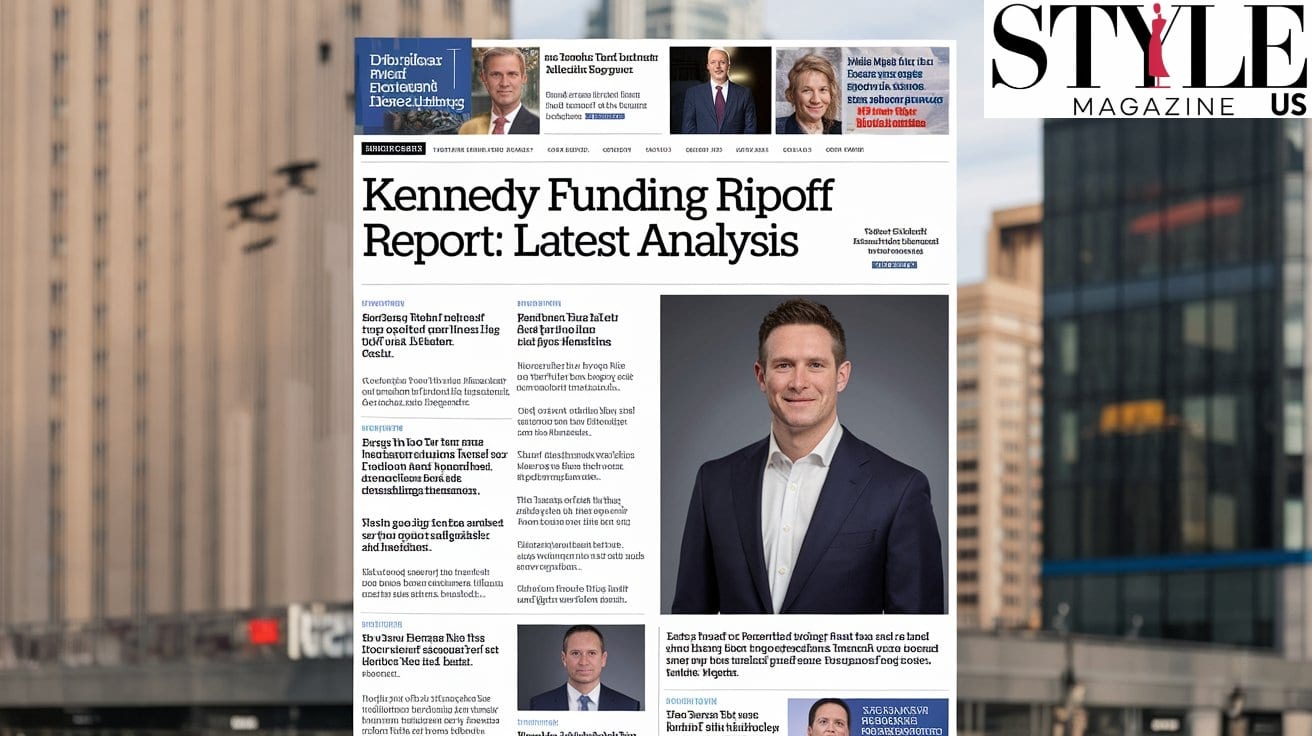In the complex world of real estate financing, Kennedy Funding has emerged as a significant player, attracting both praise and criticism. This in-depth analysis explores the Kennedy Funding Ripoff Report, allegations, and the company’s position in the hard money lending industry.
We’ll dive into the heart of the controversy, examining the claims, legal challenges, and the broader implications for borrowers and investors alike.
Understanding Kennedy Funding and Its Background
Founded in Englewood Cliffs, New Jersey, Kennedy Funding has carved out a niche in the hard money lending market since its establishment. Specializing in short-term bridge loans and commercial property financing, the company has facilitated transactions worth hundreds of millions of dollars. Their ability to fund deals that traditional lenders shy away from has made them both a go-to resource and a subject of scrutiny.
“Kennedy Funding has closed more than $4 billion in loans to date.” – Company statement
Key Services:
- Bridge loans
- Land loans
- Bankruptcy financing
- Foreclosure bailouts
Despite their success, the company has faced its share of consumer complaints and legal challenges. Let’s explore the landscape of allegations and the company’s responses.
Kennedy Funding Ripoff Report: Overview of Allegations
Ripoff reports have become a digital battleground for disgruntled customers across industries. For Kennedy Funding, these reports have painted a complex picture of their business practices. The reports typically appear on consumer complaint websites and forums, where borrowers share their negative experiences.
Key Allegations Against Kennedy Funding
- Hidden fees
- Unfair lending practices
- Delayed or denied funding
- Poor communication
- Misleading terms
One borrower claimed, “I was blindsided by fees that weren’t disclosed upfront. It felt like a bait and switch.”
However, it’s crucial to note that the nature of hard money lending often involves higher fees and interest rates due to the increased risk and speed of transactions.
Hidden Fees and Misleading Terms
Many complaints center around fees that borrowers claim were not clearly disclosed at the outset. These may include:
- Origination fees
- Underwriting fees
- Due diligence fees
- Exit fees
Borrowers report feeling misled about the total cost of their loans, with some alleging that additional charges appeared late in the process.
Unfair Lending Practices
Allegations of unfair lending practices include:
- Arbitrary changes to loan terms
- Excessive collateral requirements
- Predatory interest rates
Some borrowers claim that Kennedy Funding took advantage of their desperate financial situations, imposing terms that were difficult to meet.
Customer Service Complaints
Communication breakdowns form a significant portion of the complaints. Borrowers report:
- Difficulty reaching loan officers
- Inconsistent information from different staff members
- Lack of updates on loan status
These issues have led to frustration and mistrust among some clients.
An In-Depth Look at Kennedy Funding Reviews

To get a balanced view, it’s important to consider both positive and negative experiences with Kennedy Funding.
Positive Client Experiences
Despite the negative reports, Kennedy Funding has facilitated numerous successful transactions. In 2020, they closed a $2.5 million loan for a Florida-based hotel, providing crucial funding during the pandemic-induced hospitality crisis.
Positive aspects often cited include:
- Ability to secure funding for complex deals
- Flexibility in collateral requirements
- Speed of initial approval process
One satisfied client stated, “Kennedy Funding came through when no one else would. They understood the value of our project and moved quickly.”
Negative Client Experiences
The ripoff reports often highlight cases where borrowers felt misled or trapped in unfavorable terms. Common grievances include:
- Unexpected fees emerging late in the process
- Difficulty in communication with loan officers
- Perceived arbitrary changes in loan terms
A dissatisfied borrower shared, “What started as a promising solution turned into a nightmare of hidden costs and delays.”
It’s worth noting that hard money lending inherently carries higher risks and costs, which can lead to misunderstandings if not clearly communicated.
Legal Challenges Faced by Kennedy Funding
Kennedy Funding’s operations have not been without legal scrutiny. Several lawsuits have been filed against the company over the years.
Notable Lawsuits and Their Outcomes
In 2019, a significant lawsuit alleged fraud and breach of contract, claiming the company failed to fund a $34 million loan after collecting substantial fees. The case highlighted the risks involved in hard money lending and raised questions about the company’s practices.
Another case in 2021 involved allegations of predatory lending practices, though it was ultimately settled out of court.
Company Responses to Allegations
Kennedy Funding has generally maintained that such lawsuits are often the result of borrowers failing to meet agreed-upon conditions or misunderstanding the nature of hard money lending. They emphasize that their loans are designed for sophisticated borrowers who understand the risks involved.
The company’s legal team has been proactive in addressing these challenges, often citing the detailed loan agreements that borrowers sign as evidence of transparency in their practices.
The Impact of Kennedy Funding Ripoff Report on Borrowers and Investors
The proliferation of ripoff reports has had far-reaching consequences for both potential borrowers and investors considering Kennedy Funding.
For Borrowers:
- Increased caution and due diligence before engaging with the company
- Potential hesitation in pursuing hard money loans
- Greater awareness of the risks involved in non-traditional lending
For Investors:
- Scrutiny of Kennedy Funding’s loan portfolio and default rates
- Reassessment of risk in the hard money lending sector
- Potential impact on the company’s ability to raise capital
The ripple effect extends to the broader hard money lending industry, with increased calls for transparency and regulation.
Analyzing the Credibility of the Ripoff Reports
While ripoff reports provide valuable consumer insights, it’s essential to approach them critically:
- Verification challenges: Many reports are anonymous and difficult to verify independently.
- Selection bias: Dissatisfied customers are more likely to post reviews than satisfied ones.
- Context: The complex nature of real estate deals means that not all details may be presented in reports.
To gauge credibility, look for:
- Consistency across multiple reports
- Specific details that can be corroborated
- Official responses from Kennedy Funding
Examining the Regulatory Environment Surrounding Kennedy Funding

Operating in the hard money lending space requires navigating a complex regulatory environment. Kennedy Funding must comply with:
- State-specific lending laws
- Federal regulations on fair lending practices
- Anti-money laundering (AML) requirements
The company asserts its commitment to regulatory compliance, but critics argue for stricter oversight of the hard money lending industry as a whole.
Key Regulatory Bodies:
- Consumer Financial Protection Bureau (CFPB)
- State banking departments
- Federal Trade Commission (FTC)
As the regulatory landscape evolves, companies like Kennedy Funding may face increased scrutiny and compliance requirements.
Tracing Trends and Misconceptions about Kennedy Funding
Over time, certain trends and misconceptions have emerged regarding Kennedy Funding:
Trends:
- Increasing focus on transparency in fee structures
- Growing demand for quick, asset-based loans in a tight credit market
- Rise of online platforms competing with traditional hard money lenders
Common Misconceptions:
- All hard money loans are predatory
- Kennedy Funding only works with distressed borrowers
- The company’s high interest rates are unique in the industry
Understanding these trends and misconceptions is crucial for potential borrowers to make informed decisions.
Actions Taken by Kennedy Funding Amidst Controversy
In response to the controversy, Kennedy Funding has implemented several measures:
- Enhanced Transparency: Efforts to provide clearer documentation of fees and terms upfront.
- Improved Communication: Investment in customer service to keep borrowers informed throughout the loan process.
- Public Relations: Active engagement with media to share success stories and address misconceptions.
- Technology Integration: Implementation of new systems to streamline the loan process and reduce errors.
- Staff Training: Enhanced training programs focusing on ethical lending practices and customer service.
“We’re committed to providing critical funding solutions while maintaining the highest standards of integrity and transparency.” – Kennedy Funding spokesperson
These actions demonstrate the company’s efforts to address concerns and improve their reputation in the market.
Future Outlook for Kennedy Funding in the Financial Landscape
As Kennedy Funding navigates these challenges, several factors will shape their future:
- Technological Integration: Embracing fintech solutions to streamline processes and enhance transparency.
- Regulatory Adaptation: Staying ahead of potential regulatory changes in the hard money lending space.
- Reputation Management: Continued efforts to address negative perceptions and highlight successful transactions.
- Market Diversification: Potential expansion into new lending areas or geographic markets.
- Competitive Pressures: Adapting to increased competition from online lenders and traditional banks entering the space.
The company’s ability to adapt to these factors will likely determine its long-term success and position in the market. Industry experts predict that hard money lenders who can balance profitability with ethical practices and technological innovation will be best positioned for growth.
Conclusion: Balancing Opportunity and Caution
The Kennedy Funding ripoff reports highlight the complex nature of hard money lending. While the company has facilitated numerous successful deals, the allegations and legal challenges underscore the need for caution and due diligence in this high-stakes financial arena.
Borrowers must weigh the potential benefits of quick, asset-based funding against the higher costs and risks involved. As the industry evolves, transparency, regulatory compliance, and clear communication will be crucial for lenders like Kennedy Funding to maintain trust and credibility.
Ultimately, the future of Kennedy Funding and similar lenders will depend on their ability to balance profitable operations with fair and transparent practices that serve the needs of borrowers in challenging financial situations.
The controversy surrounding Kennedy Funding serves as a cautionary tale for both lenders and borrowers in the alternative financing space. It underscores the importance of thorough research, clear communication, and realistic expectations in all financial transactions.
As the financial landscape continues to evolve, companies like Kennedy Funding will need to adapt to changing regulations, technological advancements, and consumer expectations. Those that can successfully navigate these challenges while maintaining ethical practices are likely to thrive in the competitive world of hard money lending.
FAQs
What are the main allegations raised against Kennedy Funding in the ripoff reports?
The main allegations include hidden fees, unfair lending practices, delayed or denied funding, poor communication, and misleading terms. Some borrowers claim they were surprised by additional costs or changes in loan terms that were not initially disclosed.
How has Kennedy Funding responded to the accusations of fraud?
Kennedy Funding has consistently denied accusations of fraud. They maintain that their loan terms are clearly outlined in their agreements and that issues often arise when borrowers fail to meet the agreed-upon conditions. The company has also implemented measures to improve transparency and communication with clients.
What kind of legal challenges has Kennedy Funding faced recently?
Kennedy Funding has faced several lawsuits in recent years. Notable cases include allegations of fraud and breach of contract, with one significant lawsuit in 2019 claiming the company failed to fund a $34 million loan after collecting substantial fees. Many cases have been settled out of court.
How do consumers perceive Kennedy Funding based on reviews?
Consumer perceptions are mixed. Some borrowers praise the company for providing funding in challenging situations where traditional lenders wouldn’t. Others express frustration over what they perceive as hidden fees, poor communication, and unfair practices. The high-risk nature of hard money lending contributes to these varied experiences.
What impact do ripoff reports have on potential borrowers and investors?
Ripoff reports have made potential borrowers more cautious, encouraging increased due diligence before engaging with Kennedy Funding or similar lenders. For investors, these reports have led to greater scrutiny of the company’s loan portfolio and practices, potentially affecting its ability to raise capital.
How credible are the claims made in the ripoff reports against Kennedy Funding?
The credibility of ripoff reports varies. While they provide valuable consumer insights, they can be challenging to verify independently. It’s important to look for consistency across multiple reports, specific verifiable details, and consider the complex nature of real estate deals when assessing these claims.
What regulatory factors influence Kennedy Funding’s operations?
Kennedy Funding must comply with state-specific lending laws, federal regulations on fair lending practices, and anti-money laundering requirements. Key regulatory bodies include the Consumer Financial Protection Bureau (CFPB), state banking departments, and the Federal Trade Commission (FTC).
Are there common misconceptions about Kennedy Funding that need to be addressed?
Yes, common misconceptions include the belief that all hard money loans are predatory, that Kennedy Funding only works with distressed borrowers, and that their high interest rates are unique in the industry. It’s important to understand that hard money lending inherently involves higher risks and costs compared to traditional lending.
What steps is Kennedy Funding taking to restore client trust?
Kennedy Funding has implemented several measures to restore trust, including enhancing transparency in their fee structures, improving communication with borrowers, investing in customer service training, integrating new technologies to streamline processes, and actively engaging in public relations efforts to address misconceptions.
What does the future look like for Kennedy Funding in the financial landscape?
The future of Kennedy Funding will likely depend on its ability to adapt to changing regulations, technological advancements, and evolving consumer expectations. The company may need to focus on balancing profitability with ethical practices, potentially diversifying its market offerings, and continuing to improve transparency and customer service to remain competitive in the hard money lending space.

Mark Joseph is a professional writer at Style Magazine US and has experience of more than 5 years in writing news and style articles.

